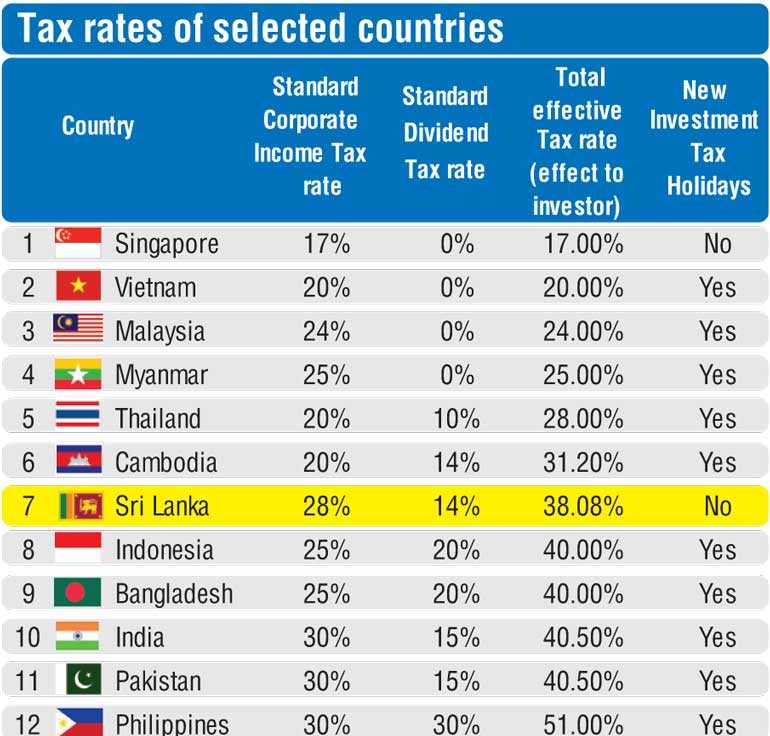Sunday Feb 22, 2026
Sunday Feb 22, 2026
Monday, 2 July 2018 00:39 - - {{hitsCtrl.values.hits}}

By Nisthar Cassim
Lobbying by the private sector for the Government to reintroduce straightforward tax holidays as a key impetus to kick-start much-needed investments both foreign and local is gathering momentum ahead of preparation for the 2019 Budget with many viewing it rationally as a time-bound basis rather than the previous open-ended approach.
The Yahapalanaya Government did away with tax holidays, a move that was welcomed by the International Monetary Fund (IMF) but scorned by the private sector.

Despite the introduction of targeted capital allowances as opposed to tax holidays, the desired level of FDIs or local investments hasn’t been seen hence the fresh lobbying by the private sector and several ministers being receptive to the idea.
The record FDIs in 2017 worth $ 1.9 billion, which the Government had been claiming, is largely due to projects by Chinese state-owned companies and by a very few firms.
To ensure a larger flow of FDIs and widespread new private sector investments, it is argued that the re-introduction of tax holidays was critical.
In a sample of 12 Asian countries, only Sri Lanka and Singapore weren’t offering any new investment tax holidays (see table).
If one leaves out Singapore, the most competitive Asian economy, Sri Lanka remains the odd one out of the 12 regional economies which believes there is no need for tax holidays for new investments.
Analysts claimed this policy was ill-advised, especially when 10 other Asian countries have found offering tax holidays necessary despite having their own macroeconomic challenges like Sri Lanka. Other countries in the sample are Vietnam, Malaysia, Thailand, Indonesia, Myanmar, Cambodia, the Philippines, India, Bangladesh and Pakistan.
As revealed in the table, this isolated stand of Sri Lanka comes also whilst the country’s tax rates remain relatively high. Sri Lanka ranked seventh lowest in terms of a total effective tax rate of 38%. For some sectors the rate is higher.
Countries such as Vietnam, Malaysia, Thailand, Myanmar and Cambodia are much lower than Sri Lanka’s whilst they also offer tax holidays, making their economies far more attractive for investments.
Vietnam is a classic model for Sri Lanka if it wants inspiration. Vietnam has attracted the bulk of the $ 108 billion in FDIs since 2007 due to tax holidays and continues to treat big-ticket investments in a special way.
For example, Samsung has invested $ 17 billion in Vietnam and accounts for a quarter of Vietnam’s exports of $ 214 billion in 2017. Its Vietnam venture’s revenue in 2017 was a staggering $ 58 billion or 75% of the total value of Sri Lanka’s economy.
Vietnam’s FDI last year amounted to a high 8% of GDP, more than double the rate that went to comparable economies in the region according to the popular magazine The Economist. Foreign-owned firms now account for nearly 20% of the country’s output. The economy grew at 7.4% year-on-year in the first quarter of 2018, one of the fastest rates in Asia.
Those who argue against tax holidays insist the policy erodes Government revenue and could be misused and have not attracted enough investments in the past. They point out that the global experience and current consensus are that an appropriate investment climate is more relevant to attract foreign (or even domestic) direct investments than tax incentives.
Those who are for tax holidays however point out that low Government revenue is largely due to poor enforcement and the low base of taxpayers. Even before the new Inland Revenue Act was passed the Yahapalanaya Government had listed higher revenue to GDP as one of its achievements. This is due to improvement in enforcement, administration and partly due to new or higher taxes.
Nevertheless, the need to accelerate investments both foreign and local makes it imperative for the Government to reconsider the re-introduction of tax holidays for a limited period. The improved fiscal management and macroeconomic management will give the Government some space for such a limited time period initiative, private sector sources pointed out.
“Despite the best of intentions and efforts by the Yahapalanaya Government since assuming office, the business and investor sentiment has been depressed. Several policy inconsistencies and a lack of clarity and direction have dampened local and foreign investor optimism. This explains the relatively slow takeoff in FDIs and local investments despite sound fiscal and monetary policy management, macroeconomic stability and good governance. Though late, the Government should give a boost with the re-introduction of tax holidays in the 2019 Budget, effectively the last for the current term of the Government and kick-start a fresh round of proper and broad-based FDIs and local investments,” they emphasised.
What the private sector has had of late is targeted capital allowances which directly reward the investment in capital. Accordingly, a company investing more than $ 3 million in depreciable assets gets a capital allowance of 100% on top of the regular depreciation schedule. For investments over $ 100 million, the capital allowance is 150%. There are also benefits for investment in R&D and the IT sector, and for investments in the Northern Province.
Strategic sectors such as exports, tourism and IT are taxed at a concessional corporate tax rate of 14%. Finance Ministry has maintained that this transparent and attractive investment incentive package is expected to create a strong stimulus for future investments into Sri Lanka.